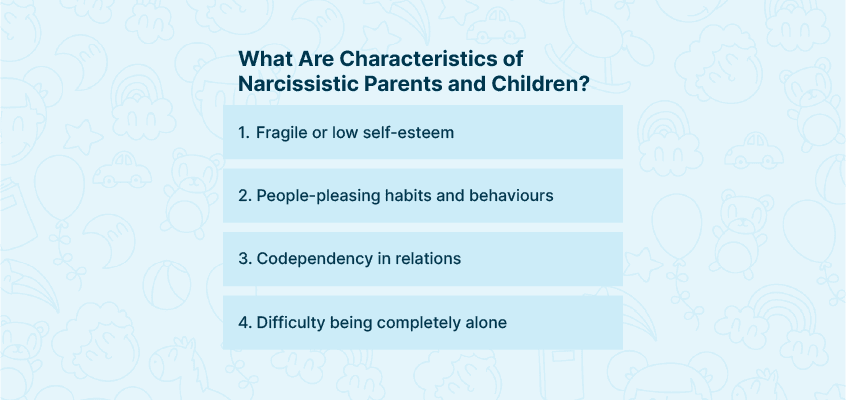Narcissistic parents are incredibly possessive of their children. They feel threatened if their child starts developing any independence. The kids of narcissistic parents experience shame and humiliation as they grow up and have low self-esteem. Such children either grow up to be self-saboteurs or high achievers and require professional help for recovering from narcissistic abuse.
What Is Narcissistic Parenting?
Narcissistic parenting is when narcissistic parents focus their lack of grandiosity and empathy towards their child. Such parents often view their children as an extension of themselves, and thus, they see their children as existing solely for their selfish requirements. Narcissistic parenting can envisage itself in various ways, such as,
- Chaotic and unpredictable moods;
- Lack of narcissistic rage and empathy;
- Being overly critical;
- Pigeon-holding;
- Financial abuse and manipulation;
- They are living vicariously through their children and grandiosity.
Narcissistic parenting takes a toll on the kids. They have distorted perceptions of how emotional relations work, taking the same out on their children. Because of chaos and unpredictability, the child of a narcissistic parent often tries to mitigate their parents’ unstable and inconsistent mood. This entire procedure generally looks like compliance, codependency, manipulation, and perfectionism.
Our Wellness Programs
Looking for services related to this subject? Get in touch with these experts today!!
Experts

Kirti Bajpai

India
Psychologist
Experience: 5 years

Mansi Chawla

India
Psychologist
Experience: 12 years

Sapna Zarwal

India
Psychologist
Experience: 19 years

Davis Emerson

India
Psychologist
Experience: 6 years

Vasudha Agarwal

India
Psychologist
Experience: 13 years
How to Identify Narcissistic Parents?
There are several tell-tale signs of narcissistic parents. The most common behaviours that make the identification of narcissistic parents easy are as follows:
- Dismissing others’ feelings mainly because they do not feel them.
- Not listening or failing to relate or engage with what people say.
- Convincing themselves through shaming, blaming, and telling themselves that people do not deserve their help.
- Shaming people for bringing up requirements that they do not have.
- Requiring constant deference and obedience.
- Gaslighting people into believing that they deserve their midst, they maintain transactional relations. For example, compliment them on getting their help in any circumstances. Keep on praising them for their behaviour and their habits.
The majority of these traits are directly related to the ability of the narcissistic parents to empathise and need to maintain their very own emotional requirements over the others.
What Are Characteristics of Narcissistic Parents and Children?
The characteristics of narcissistic parents and children include:
- Fragile or low self-esteem
- People-pleasing habits and behaviours
- Codependency in relations
- Drug addiction
- Difficulty being completely alone
- Relationship problems
- Domestic violence
- Manipulation
- Feelings of inadequacy
- Mutilation and self-harm
What Are the Effects of Being Raised by a Narcissistic Parent?
Narcissistic parenting affects children in many ways. The effects of being raised by a narcissistic parent are as follows:
- They do not acknowledge the feelings of the child and their reality.
- The child will not feel seen or heard.
- Treating the child of a narcissistic parent is an accessory instead of a person.
- Children of narcissistic parents do not learn the correct way of identifying or trusting their feelings. They grow up doubting themselves at every stage of life.
- These children are valued more for their parents, not for their individuality.
- Such children know that how they appear is more important than how they feel.
- Children of narcissistic parents find it very difficult to be accurate. They have this strong belief that self-image is more significant than originality.
- The child also learns to keep secrets to protect parents and family.
- The child will develop this assertive behaviour of not trusting others.
How Do You Recognise the Signs of Narcissistic Parenting in Your Own Family?
Narcissistic personality disorder generally entails a pattern of arrogant and self-centred thinking and behaviour. It is easy to recognise the signs in your family. Such people lack consideration and empathy for other individuals and are in this excessive requirement of admiration from others.
Hence, if there are narcissistic individuals in the family, it will get easy to identify them through these signs. They are not fit to live in a family because their thinking and behaviour reflect in almost every stage of their lives, from friendships, work, relationships and family.
Such people also do not like changing their behaviour even if they know that it is causing many problems for them. They always have this tendency of turning blame onto other individuals. What’s more, these individuals are susceptible. They react very severely to disagreements and criticisms, and therefore it is hard to live with such individuals in families.
How to Be a Good Parent If You’re the Child of a Narcissist?
Being the child of a narcissist does not mean that they cannot become a good parent. There are always good chances for children of narcissistic parents to move on in life and become good parents or adults. It’s just that they need to put in some extra effort. Those children can learn many things by reading books portraying the right way of dealing with different problems they need to face because of being the child of a narcissist. At the same time, watching online videos that offer helpful tips on coping, like looking at the positives in a situation instead of focusing on the negativities, can help.
The children of narcissistic parents can do several things to heal themselves and become good parents. Nevertheless, the most significant thing here is getting hold of someone who clearly understands what these children have gone through in their childhood, which should be a person who will not judge them for the choices in the past.
Conclusion
It is hard to be the child of a narcissistic parent. That’s because children always wish to have parents who nurture, protect, love, and guide them through the ups and downs of life. They can do nothing much for this loss except give themselves time and mourn for it. Additionally, they should learn the correct way of setting and enforcing healthy boundaries. Also, get help from experienced professionals like United We Care. This mental health platform for wellness and therapy has licensed psychotherapists to provide online counselling and required therapies to guide narcissistic parents and children.
References:
https://www.choosingtherapy.com/narcissistic-parent/
https://theawarenesscentre.com/narcissistic-parent/
https://www.psychologytoday.com/us/blog/the-legacy-distorted-love/201802/the-real-effect-narcissistic-parenting-children
https://www.supportiv.com/depression/raised-by-narcissists

















